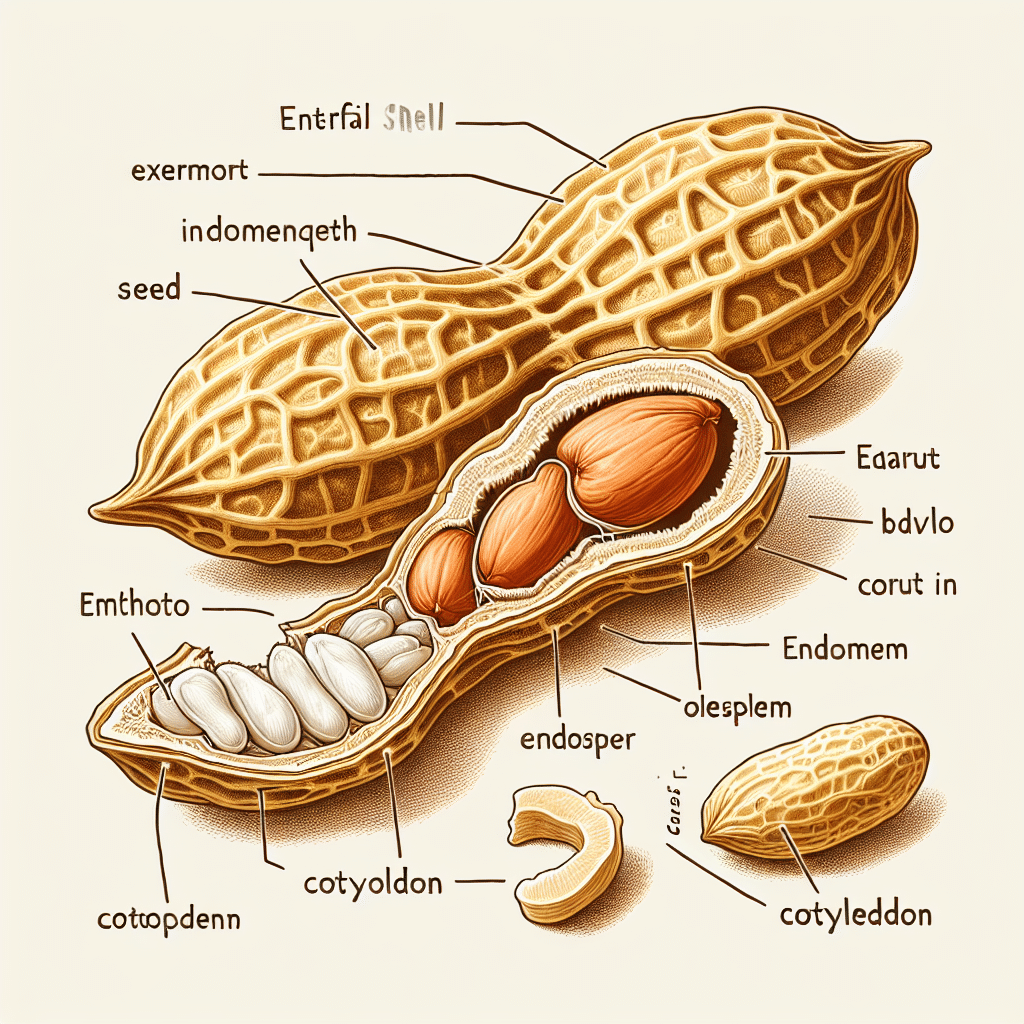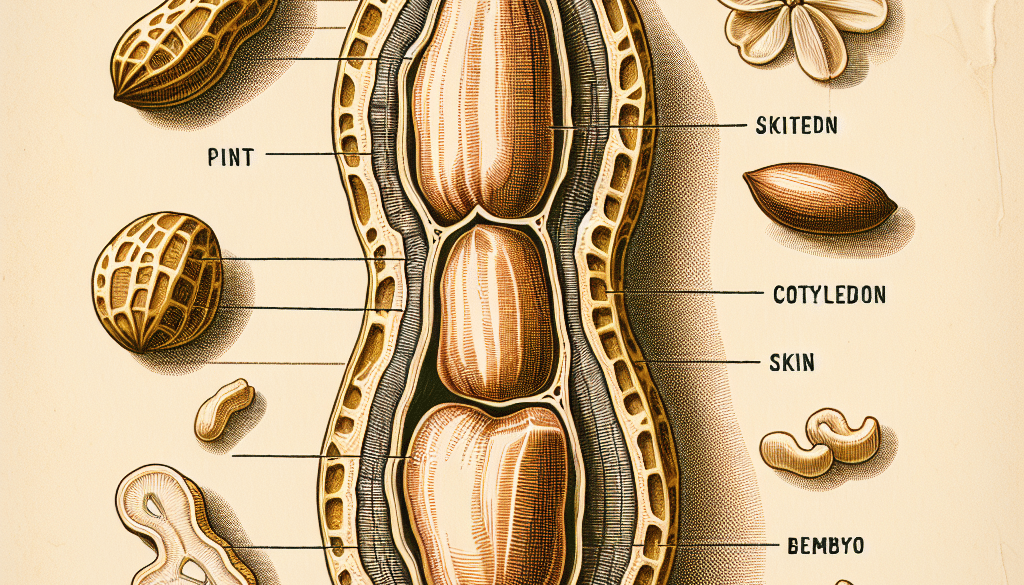Parts of a Peanut: Anatomy of a Nutty Snack
-
Table of Contents
- Peanut Anatomy: Exploring the Nutty Snack’s Structure
- The Shell: Nature’s Packaging
- The Seed: A Nutritional Powerhouse
- The Skin
- The Cotyledons
- The Embryo
- The Nutritional Profile of Peanuts
- Environmental Impact and Sustainability
- Conclusion: The Versatile and Nutritious Peanut
- Discover ETprotein’s High-Quality Protein Products
Peanut Anatomy: Exploring the Nutty Snack’s Structure

Peanuts, often mistaken for nuts, are actually legumes that have become a staple snack and ingredient in cuisines worldwide. Despite their popularity, many people are unaware of the complex anatomy of a peanut and the various parts that contribute to its unique taste, texture, and nutritional value. In this article, we will delve into the fascinating world of peanuts, exploring each part of this nutty snack and its significance.
The Shell: Nature’s Packaging
The peanut shell is the outermost layer, providing a natural protective barrier for the two, sometimes three, seeds inside. This fibrous husk is typically tan or beige in color and has a netted texture. While not consumed, the shell plays a crucial role in the peanut’s life cycle by shielding the seeds from pests and diseases.
- Environmental Benefits: Peanut shells are often used in agricultural practices as compost or mulch, contributing to soil health and sustainability.
- Industrial Uses: Shells can be processed into various products, including particleboard, paper, and even fuel.
The Seed: A Nutritional Powerhouse
Inside the shell lies the peanut seed, the edible part that we commonly consume. The seed itself is composed of several parts, each with its own function and nutritional profile.
The Skin
The thin, papery layer that directly covers the peanut seed is known as the skin or testa. It ranges in color from reddish-brown to purple and is rich in antioxidants, particularly polyphenols, which may provide health benefits such as reducing the risk of heart disease and certain cancers.
The Cotyledons
The bulk of the peanut seed is made up of two halves called cotyledons. These are the “meat” of the peanut, where most of the nutrients are stored. The cotyledons contain high levels of protein, healthy fats, vitamins, and minerals.
- Protein Content: Peanuts are an excellent source of plant-based protein, making them a popular choice for vegetarians and vegans.
- Healthy Fats: The monounsaturated and polyunsaturated fats found in peanuts contribute to heart health and can help lower bad cholesterol levels.
- Vitamins and Minerals: Peanuts are rich in B vitamins, vitamin E, magnesium, phosphorus, and potassium, all essential for maintaining good health.
The Embryo
Located at the base of the cotyledons, the embryo is the life source of the peanut plant. It contains the genetic material necessary for sprouting into a new plant. While tiny, the embryo is packed with nutrients that support the growth of the seedling.
The Nutritional Profile of Peanuts
Peanuts are not only delicious but also offer a wealth of health benefits. They are an energy-dense food, providing a substantial amount of calories from proteins and fats, which are essential for building and repairing tissues and maintaining a healthy metabolism.
- Heart Health: Regular consumption of peanuts has been linked to a reduced risk of heart disease, thanks to their beneficial fat profile and antioxidant content.
- Weight Management: Despite their high-calorie content, peanuts have a satiating effect that can help with weight management when consumed in moderation.
- Diabetes Control: The low glycemic index of peanuts makes them a good snack for people with diabetes, helping to regulate blood sugar levels.
Environmental Impact and Sustainability
Peanuts have a relatively low environmental footprint compared to other sources of protein. They require less water and can improve soil fertility by fixing nitrogen, reducing the need for chemical fertilizers. This makes peanuts a more sustainable choice for those looking to reduce their environmental impact.
Conclusion: The Versatile and Nutritious Peanut
In conclusion, the peanut is a complex legume with a simple appearance. From its protective shell to the nutrient-rich seed, each part of the peanut plays a role in its development and contributes to its health benefits. Understanding the anatomy of this nutty snack can enhance our appreciation for peanuts and encourage us to incorporate them into our diets in various forms.
Discover ETprotein’s High-Quality Protein Products
If you’re looking to incorporate more plant-based proteins into your diet, ETprotein offers a range of products that can help. Their selection includes organic rice protein, clear rice protein, pea protein, clear pea protein, pumpkin seed protein, sunflower seed protein, mung bean protein, and peanut protein. These high-quality proteins are non-GMO, allergen-free, and have a neutral taste, making them perfect for various applications in the food and beverage industry.
About ETprotein:
ETprotein, a reputable protein Chinese factory manufacturer and supplier, is renowned for producing, stocking, exporting, and delivering the highest quality organic bulk vegan protein and plant proteins. They include Organic rice protein, clear rice protein, pea protein, clear pea protein, pumpkin seed protein, sunflower seed protein, mung bean protein, peanut protein etc. Their offerings, characterized by a neutral taste, non-GMO, allergen-free attributes, cater to a diverse range of industries. They serve nutraceutical, pharmaceutical, cosmeceutical, veterinary, as well as food and beverage finished product distributors, traders, and manufacturers across Europe, USA, Canada, Australia, Thailand, Japan, Korea, Brazil, and Chile, among others.
ETprotein specialization includes exporting and delivering tailor-made protein powder and finished nutritional supplements. Their extensive product range covers sectors like Food and Beverage, Sports Nutrition, Weight Management, Dietary Supplements, Health and Wellness Products, and Infant Formula, ensuring comprehensive solutions to meet all your protein needs.
As a trusted company by leading global food and beverage brands and Fortune 500 companies, ETprotein reinforces China’s reputation in the global arena. For more information or to sample their products, please contact them and email sales(at)ETprotein.com today.














